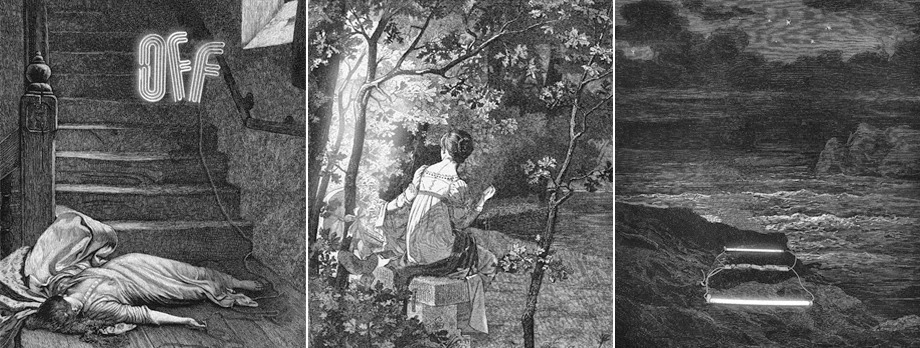Even the simplest darkness of night whispers suggestion to the mind.
Annie Dillard, Pilgrim at Tinker Creek
Unfortunately, nature is very much a now-you-see it now you-don't affair. A fish flashes then dissolves in the water, before my eyes like so much salt. Deer apparently ascent bodily into heaven; the brightest oriole fades into leaves. These disappearances stun me into stillness and concentration: they say of nature that it conceals with a great nonchalance, and they say of vision that it is a deliberate gift, the revelation of a dancer who for my eyes only flings away her seven veils. For nature does reveal as well as conceal: now you don't see it, now you do...
It's all a matter of keeping my eyes open. Nature is like one of those line drawings of a tree that are puzzles for children: can you find hidden in the leaves a duck, a house, a boy, a bucket, a zebra and a boot? Specialists can find the most incredibly well-hidden things...
I squint at the wind because I read Stewart Edward White: "I have always maintained that if you looked closely enough you could see the wind -- the dim hardly-made-out, fine débris fleeing high in the air." White was an excellent observer, and devoted an entire chapter of The Mountains to the subject of seeing deer. "As soon as you can forget the naturally obvious and construct an artificial obvious, then you too will see deer."
Annie Dillard, Pilgrim at Tinker Creek, Seeing
Aylin Langreuter is a multidisciplinary artist based in Bavaria. With partner industrial designer Dominique de La Fontaine, they created an art/design collective company named Dante-Goods and Bads in 2012. The young brand conscious of its ambitious and fragile endeavour has no other goal than to give life to "objects with qualities above and beyond the substantial" with associative qualities like "emotions, habits, memories, tastes, aversions, the good, the bad, never the ugly." Here is for the statement. Very much impressed by Jean Baudrillard's quote:
"I almost felt as if the object possessed passion at least it seemed to have a life of its own and be able to escape the passiveness of its usage, to achieve a kind of autonomy and maybe even the power to take revenge on a subject that was all too sure of its command."
-- their art aims to voicing the things' demands. Definitely on the side of the object, they strive to give them a sense of family, allowing them a right to growth and expansion.




Wonderful quotes upon which to meditate... and beautiful artworks from Aylin Langreuter.
ReplyDeleteExquisite "goods and bads."